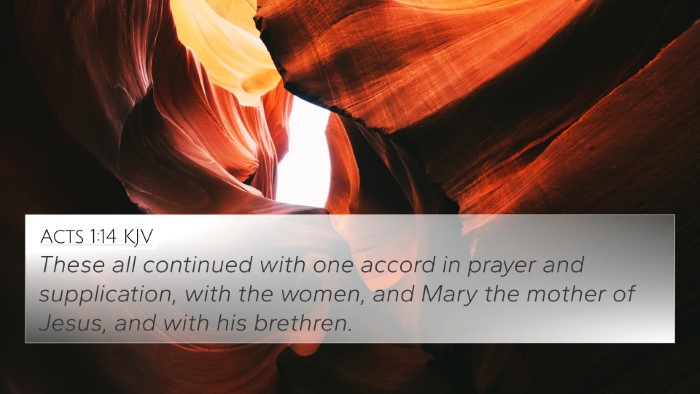Understanding 1 Corinthians 14:13
Verse: "Wherefore let him that speaketh in an unknown tongue pray that he may interpret."
Summary of Meaning
1 Corinthians 14:13 emphasizes the importance of understanding and edification in the use of spiritual gifts, particularly the gift of speaking in tongues. The Apostle Paul instructs that if one speaks in an unknown tongue, a prayer for the ability to interpret that tongue is necessary. This underscores that speaking in tongues is not for personal edification alone but for the building up of the entire church body.
Commentary Insights
-
Matthew Henry:
Henry notes that speaking in tongues without interpretation is essentially unhelpful and even detrimental to the church's growth. He argues that the primary goal of spiritual gifts is the edification of the church, and without understanding, one's utterances benefit no one. Tongues should invoke a deeper connection and communication within the church community.
-
Albert Barnes:
Barnes emphasizes the significance of the interpretation of tongues. He points out that the act of interpreting is equally regarded as a spiritual gift that facilitates understanding within congregational worship. The calling to interpret aligns with Paul's broader message regarding the orderly conduct of church services and maintaining clarity in worship.
-
Adam Clarke:
Clarke elaborates on the necessity for interpretation, stating that prayer and interpretation not only enhances the clarity of spiritual experiences but also facilitates a deeper communal worship experience. He outlines that this approach prevents confusion and promotes a spirit of unity among believers.
Cross-References
1 Corinthians 14:13 has several related scripture references that enhance its understanding:
- 1 Corinthians 14:5: Paul indicates that prophesying is better than speaking in tongues unless interpreted.
- 1 Corinthians 14:27-28: Guidelines for speaking in tongues in church settings are provided, emphasizing the need for order.
- Acts 2:4: The initial outpouring of tongues at Pentecost highlights the gift’s purpose.
- Romans 12:6-8: Discusses various spiritual gifts, including their need for proper function within the body.
- 1 Corinthians 12:10: Lists the gift of interpretation among other spiritual gifts.
- 1 Corinthians 14:19: Praises the value of speaking words that can edify others over speaking in unknown tongues.
- Ephesians 4:12: Explains that each spiritual gift is meant for the equipping of the saints for ministry.
Thematic Connections
This verse also fits within larger themes present within the New Testament, particularly in the context of:
- Community and Edification: A core theme throughout Paul's letters that reflects the importance of unity among believers.
- The Role of the Holy Spirit: The events of Pentecost and the ongoing work of the Holy Spirit in equipping the church.
- Worship and Order: Scriptural emphasis on the need for order and clarity during worship services.
Conclusion
The interpretation and understanding of 1 Corinthians 14:13 is vital for comprehending the function of spiritual gifts within the church. As we explore the cross-references and contextual themes, we see a pattern encouraging clarity and unity in worship practices. By linking these scriptures and delving into comparative analyses, believers can navigate the complexities of spiritual gifts and their proper use in the body of Christ.
Additional Resources for Cross-Referencing
For those seeking to further study and understand connections between Bible verses, consider utilizing:
- Bible concordances for exhaustive scripture searches
- Cross-reference guides that outline relationships between verses
- Tools for Bible cross-referencing that can enhance your study sessions
- Comprehensive Bible cross-reference materials available in various formats










